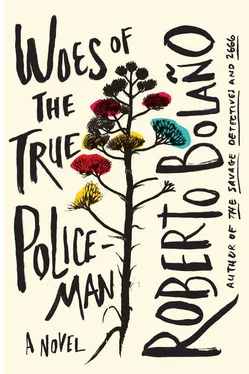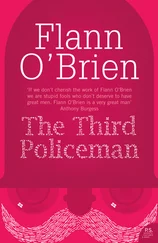Amalfitano answered the letter that same night, in his room, lying on his unmade bed, as his daughter devoured another video in the living room. In broad strokes he described his life in Santa Teresa, his work, how receptive his students were, I don’t know whether I’ve ever seen kids so interested in literature, interested, in fact, in everything that was happening in the world, all continents and all races. He didn’t say anything about his new lover, whose name was Castillo, or about how badly he was getting along with his daughter lately. He ended the letter by telling Padilla that he missed him. Though it may seem strange to you (or maybe not), I miss you. In a postcript he said that of course he remembered the man with the gold cigarette case, the one who always wore leather, and he asked why he had killed himself. In a second postcript he said that it was wonderful that Padilla was writing a novel, keep it up, keep it up.
Padilla’s response was quick to arrive. It was concise and monothematic. My novel, he said, will be like an emission of stroboscopic light, with lots of characters (though rudimentary or sketched arbitrarily and at random) and lots of violence and lots of wolf moons and dog moons and lots of erect and well-greased cocks, lots of hard cocks and lots of howling.
Amalfitano’s response, on university letterhead and written between classes on the electric typewriter in his cubicle, tried to be judicious. Too many characters could turn any novel into a collection of stories. Hard cocks, with glorious exceptions, were hardly ever literary. Howls were literary, but the place for them, their natural medium, was generally poetry, not prose. That way lies danger, he warned, and a few lines later he insisted on hearing the circumstances surrounding the painter’s suicide. Otherwise, he assured Padilla once again that he missed him and wished him the best. About his new life in Santa Teresa he said practically nothing.
The next news he had from Padilla was a postcard of the port of Barcelona. This is where we saw each other for the last time, he said. The last time ever, I think sometimes. And he disclosed the title of his novel: The God of Homosexuals .
Amalfitano returned the ball. On a postcard of Santa Teresa depicting the statue of General Sepúlveda, hero of the Revolution, he allowed that the title struck him as the right choice. It was a sad title, certainly, but the right choice. And who was this god of homosexuals? Not the goddess of love or the god of beauty, but some other god — which one? As to whether they would see each other again, he left that in the hands of the god of travelers.
Padilla’s response was swift and lengthy: the leather-wearing painter had had seemingly no reason to kill himself. He was in New York for a solo show of his work at the prestigious Gina Randall Gallery, you’ve probably never heard of her, but she’s known to the cognoscenti as one of the most powerful art dealers in Babylon. So, ruling out any financial or artistic motives (in that order, insisted Padilla), what remained were sentimental or carnal ones, but the painter was famous for his indifference to a nice pair of hips and to spoken or unspoken romantic sentiments, which meant that this possibility also had to be discarded. And if the explanation wasn’t money, art, or romance, what else could drive a man to suicide? Clearly: boredom or illness, the culprit must have been one or the other, you choose. Regarding the identity of the god of homosexuals, Padilla was categorical: he’s the god of beggars, the god who sleeps on the ground, in subway entrances, the god of insomniacs, the god of those who have always lost. Here he talked (confusedly) about Belisarius and Narses, two Byzantine generals, the former young and beautiful, the latter old and a eunuch, but both of them perfectly suited to the Emperor’s military needs, and he talked about the wages of Byzantium. He’s a helpless god, ugly and resplendent, a god who loves but whose love is terrible and always, but always , turns against him.
The wages of Chile, remembered Amalfitano, and he also thought: fuck, he’s describing the god of poets, the god of the poor, the god of the Comte de Lautréamont and Rimbaud.
The novel is moving along, said Padilla in the postcript, but the proofreading work was killing him. Too many hours comparing originals and proofs, soon he would probably need glasses. This last bit of news saddened Amalfitano. The only glasses that suited Padilla’s face were sunglasses, and then only because of the unsettling effect produced when Padilla removed them with a flourish at once provocative and endearing.
In response, he listed all the reasons why Padilla should persist at all costs with The God of Homosexuals . When you finish, he suggested with false casualness, you can come visit us. They say that the north of Mexico is delightful. This letter received no response. For a while Padilla remained silent.
Soon after this, Amalfitano began to feel watched. There were other times in his life when he’d had the same feeling: that of the prey in the woods who scents the hunter. But it was so long ago that he’d forgotten the instructions and advice received in his youth, the proper way to behave in a situation like the one that now, rather than presenting itself, was gradually creeping up on him.
II. AMALFITANO and PADILLA
Padilla said tell me, tell me about the dangers you’ve seen, and Amalfitano thought of an adolescent on horseback, himself, achingly beautiful, and then he thought of a black blanket, the blanket he wrapped around himself early in the morning at the detention camp, first he thought of its color, then its smell, and finally its texture, how nice it felt to cover his face with it and let his nose, his lips, his forehead, his bruised cheekbones, come into contact with the rough cloth. It was an electric blanket, he remembered happily, but there was nowhere to plug it in. And Padilla said my love, let my lips be like your black blanket, let me kiss those eyes that have seen so much. And Amalfitano felt happy to be with Padilla. He said: Joan, Joan, Joan, here I am at last emerging from the tunnel, all that time wasted, all those days lost, and he also thought: if only I’d met you sooner, but he didn’t say it, or rather he communicated it telepathically, so that Padilla couldn’t say you idiot, sooner? when? in a time outside of time, thought Amalfitano as Padilla kissed him softly on the back, in an ideal time, when to be awake was to dream, in a country where men love men, isn’t that the title of a novel? asked Padilla, yes, said Amalfitano, but I can’t think of the name of the author. And then, as if he were riding the night in successive waves, he returned to the black electric blanket, with its little tail and its stains, and over the shouting, shouting that announced an impending hurricane, Padilla’s voice rose like the captain of a sinking ship. This will end badly, thought Amalfitano, end badly, end badly, as Padilla’s cock sank smoothly into his old ass.
Then, as always, came the madness. Padilla introduced him to a fat, blue-eyed adolescent, the poet Pere Girau, a wonderful kid, said Padilla, you have to hear him read, he’s got a voice as rich and deep as Auden’s. And Amalfitano listened to Pere Girau read his poems and then they went out for a drive, out for drinks at the Killer Trucker and the Brothers Poyatos, and the three of them ended up in Padilla’s studio and in Padilla’s bed, and Amalfitano, consumed by doubt, thought that this wasn’t what he wanted, even though later he really did want it. But still, he would have liked a different kind of bond, spending evenings with Padilla discussing literature, for example, making time for intimacy and friendship.
Читать дальше








![О Генри - Бляха полицейского О’Руна [The Badge of Policeman O'Roon]](/books/405347/o-genri-blyaha-policejskogo-o-runa-the-badge-of-po-thumb.webp)



